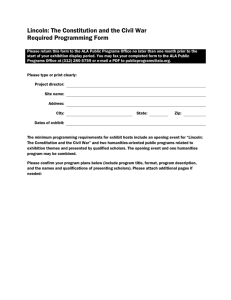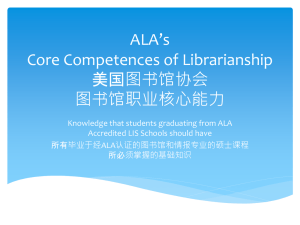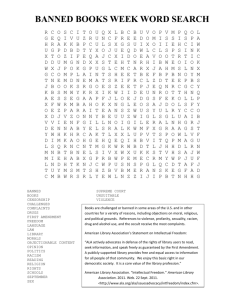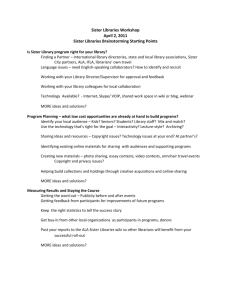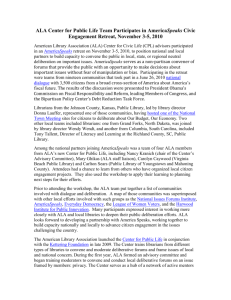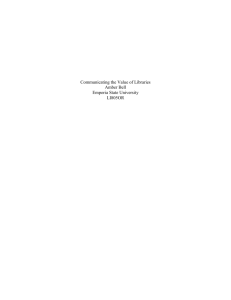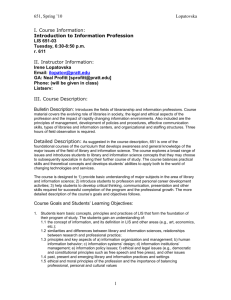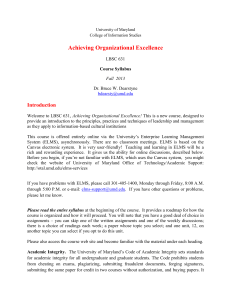Handout #2
advertisement
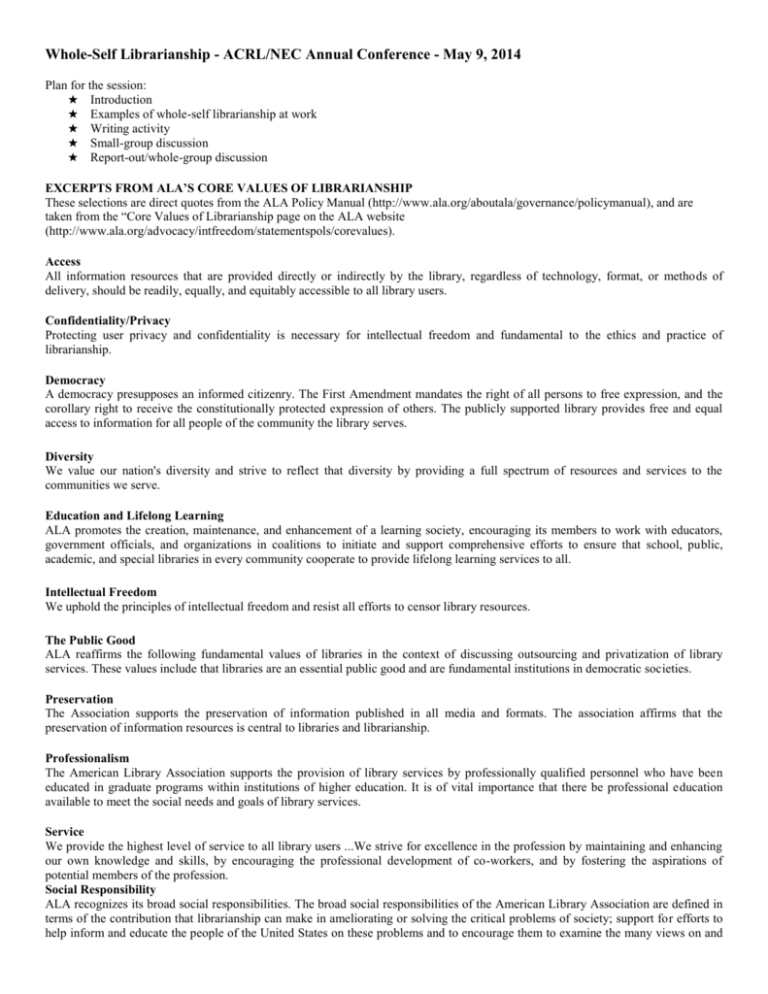
Whole-Self Librarianship - ACRL/NEC Annual Conference - May 9, 2014 Plan for the session: ★ Introduction ★ Examples of whole-self librarianship at work ★ Writing activity ★ Small-group discussion ★ Report-out/whole-group discussion EXCERPTS FROM ALA’S CORE VALUES OF LIBRARIANSHIP These selections are direct quotes from the ALA Policy Manual (http://www.ala.org/aboutala/governance/policymanual), and are taken from the “Core Values of Librarianship page on the ALA website (http://www.ala.org/advocacy/intfreedom/statementspols/corevalues). Access All information resources that are provided directly or indirectly by the library, regardless of technology, format, or methods of delivery, should be readily, equally, and equitably accessible to all library users. Confidentiality/Privacy Protecting user privacy and confidentiality is necessary for intellectual freedom and fundamental to the ethics and practice of librarianship. Democracy A democracy presupposes an informed citizenry. The First Amendment mandates the right of all persons to free expression, and the corollary right to receive the constitutionally protected expression of others. The publicly supported library provides free and equal access to information for all people of the community the library serves. Diversity We value our nation's diversity and strive to reflect that diversity by providing a full spectrum of resources and services to the communities we serve. Education and Lifelong Learning ALA promotes the creation, maintenance, and enhancement of a learning society, encouraging its members to work with educators, government officials, and organizations in coalitions to initiate and support comprehensive efforts to ensure that school, public, academic, and special libraries in every community cooperate to provide lifelong learning services to all. Intellectual Freedom We uphold the principles of intellectual freedom and resist all efforts to censor library resources. The Public Good ALA reaffirms the following fundamental values of libraries in the context of discussing outsourcing and privatization of library services. These values include that libraries are an essential public good and are fundamental institutions in democratic societies. Preservation The Association supports the preservation of information published in all media and formats. The association affirms that the preservation of information resources is central to libraries and librarianship. Professionalism The American Library Association supports the provision of library services by professionally qualified personnel who have been educated in graduate programs within institutions of higher education. It is of vital importance that there be professional education available to meet the social needs and goals of library services. Service We provide the highest level of service to all library users ...We strive for excellence in the profession by maintaining and enhancing our own knowledge and skills, by encouraging the professional development of co-workers, and by fostering the aspirations of potential members of the profession. Social Responsibility ALA recognizes its broad social responsibilities. The broad social responsibilities of the American Library Association are defined in terms of the contribution that librarianship can make in ameliorating or solving the critical problems of society; support for efforts to help inform and educate the people of the United States on these problems and to encourage them to examine the many views on and the facts regarding each problem; and the willingness of ALA to take a position on current critical issues with the relationship to libraries and library service set forth in the position statement. EXCERPTS FROM THE AMERICAN ASSOCIATION OF LAW LIBRARIES COMPETENCES LIBRARIANSHIP These are taken from the AALL Competences document at: http://www.aallnet.org/main-menu/LeadershipGovernance/policies/PublicPolicies/competencies.html. ● ● ● OF LAW AALL Competence 1.5: Understands the social, political, economic and technological context in which the legal system exists (ALA core value: public good, diversity, social responsibility) AALL Competence 1.11: Exhibits an understanding of the importance of a multidisciplinary and cross-functional approach to programs and projects within the organization (ALA core value: intellectual freedom, democracy) AALL Competence 1.16: Actively pursues personal and professional growth through continuing education (ALA core value: education & lifelong learning, service, professionalism) WRITING/REFLECTION QUESTIONS ● What are the non-library specific skills that inform our work? ● What are the various communities of practice organized around these areas of interest that we have found? ● What are the abilities we are developing/have developed through engagement with these communities that help us in our work both in and out of libraries? ● How do these practices map to the needs of our professional work? GROUP DISCUSSION QUESTIONS ● How can we make the case with supervisors for expanding the range of what is included in professional development plans? ● What are examples of when we have been able to do this, or when this has been unsuccessful? ● Can ALA's core values help us do this? ● Is there another professional organization that might make more sense in your current role? (e.g. American Association of Law Libraries, Special Libraries Association, etc.) RESOURCE GUIDE Resource guide: http://bit.ly/SEWFr1 Alana Kumbier: Critical Social Inquiry & Digital Pedagogy Librarian, Hampshire College, akumbier@hampshire.edu Rebecca Martin: Digital & Bibliographic Resources Librarian, BU Law, rymartin@bu.edu Heather McCann: Urban Studies & Planning and GIS Librarian, MIT hmccann@mit.edu Sara Smith: Arts & Humanities Librarian, Amherst College, ssmith@amherst.edu
